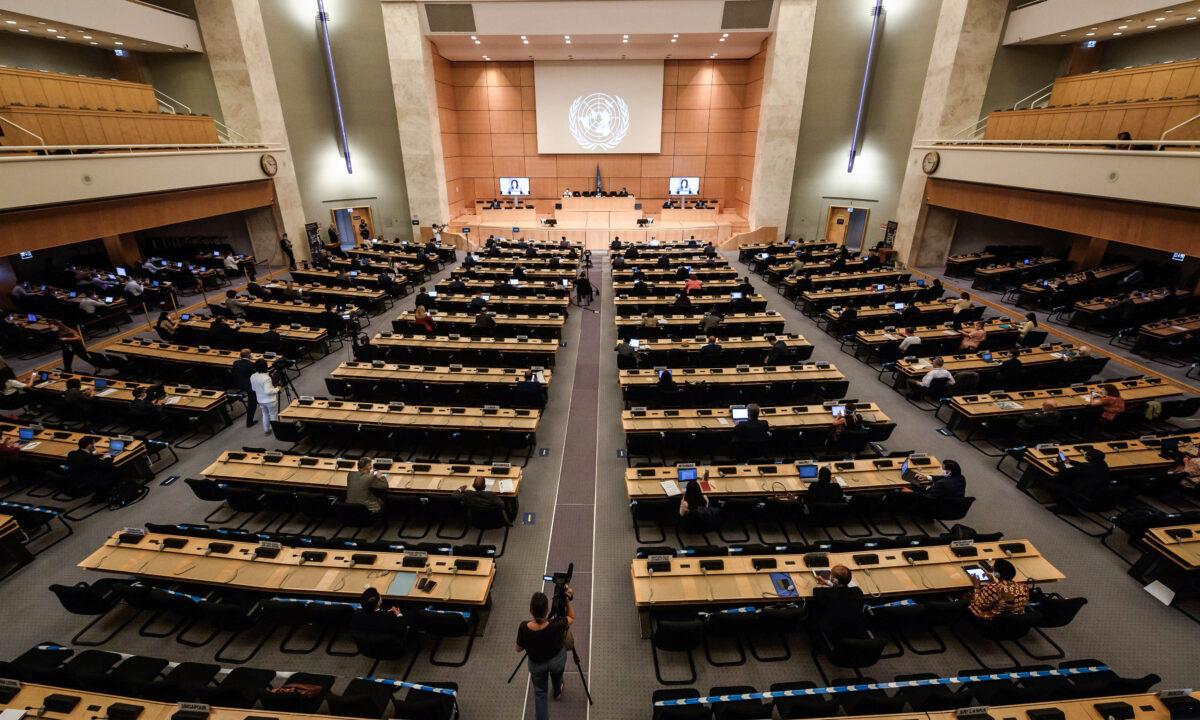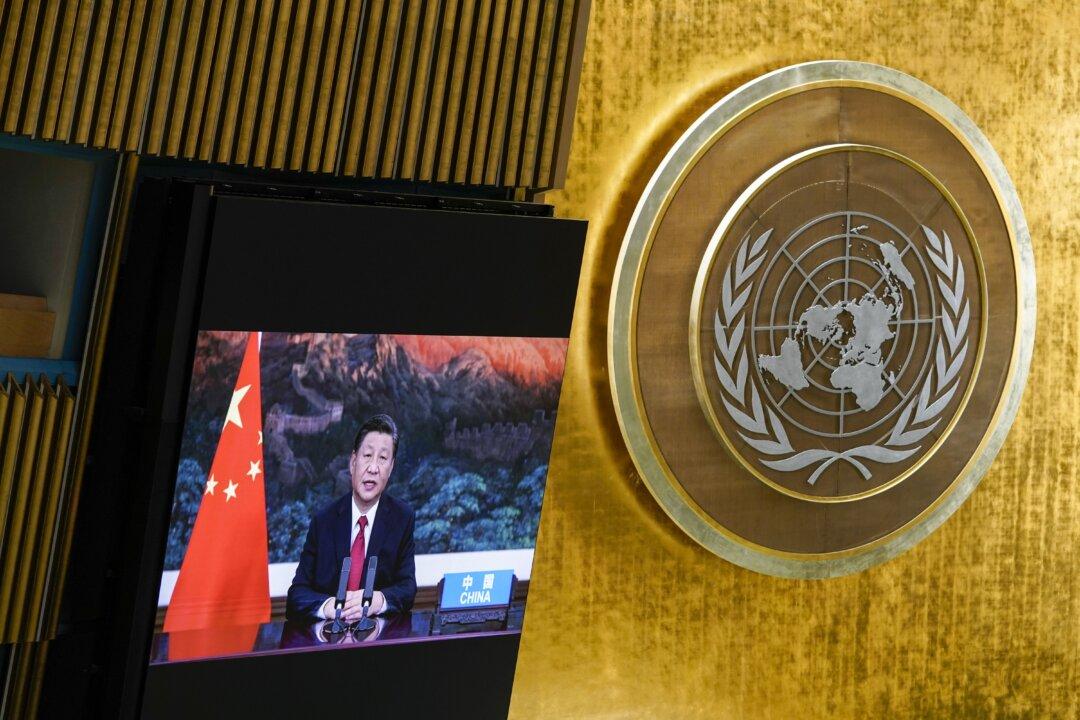China’s communist regime is increasingly subverting procedures and norms related to human rights at global forums, including the United Nations, intending to advance its agenda and minimize scrutiny of its violations, according to experts and advocates.
“Beijing will continue to write its own narratives, including on human rights, by framing a new order as she sees it, which would be entirely different from the U.S.-led allies’ perspective in the coming years,” Tsering Passang, the founder and chairman of the advocacy group Global Alliance for Tibet and Persecuted Minorities, told The Epoch Times in an email.
Several Chinese state-run media and online resources tout China’s endorsement of human rights forums and its advocacy and promotion of global human rights. In contrast, the free world has published numerous reports—including testimonies by victims who fled China—about Chinese state-perpetuated violations within and outside the country.
Experts highlight the narrative warfare this situation brings to the multilateral forums where the Chinese regime identifies every attempt of the West to hold it or its allies accountable for their human rights violations as an attack against Beijing’s foreign policy. While the regime uses the concepts of human rights in its narratives, its goal is to defend its communist policies and criticize the free world.
Benedict Rogers, the co-founder and chief executive of the Hong Kong Watch and the author of the new book “The China Nexus,” believes that, in some ways, today’s global human rights are at the mercy of Chinese foreign policy agendas.
“To a certain extent, yes, and as a P5 member of the Security Council, it can wield its veto power,” Rogers told The Epoch Times in an email. “The reason, for example, the crises in Myanmar and North Korea have not received more attention is, at least in part, because China uses its influence to protect them diplomatically and politically.”
The Chinese regime has continuously come to the rescue of its allies despite their records of human rights violations. For example, until 2020, Beijing vetoed the United Nations Security Council’s most severe and potentially effective draft resolutions against the Syrian regime 16 times, according to the Syrian Network for Human Rights (SNHR).
The SNHR, in a report in July 2020, alleged that these vetoes have led to the killing of “nearly a quarter of a million Syrians” and the “arrest of nearly 150,000 others, and the spread of impunity.”
“Particularly under President Xi Jinping’s leadership, the Chinese government does not merely seek to neutralize U.N. human rights mechanisms’ scrutiny of China, it also aspires to neutralize the ability of that system to hold any government accountable for serious human rights violations,” Richardson wrote in her paper titled “China’s Influence on the Global Human Rights System.”
She emphasized that the “rights-free development” Beijing endorsed in China is now being established as a Chinese foreign policy tool worldwide.
“Increasingly Beijing pursues rights-free development worldwide, and tries to exploit the openness of institutions in democracies to impose its world view and silence its critics,” wrote Richardson.
Passang said the Chinese Communist Party (CCP) had used its veto power in recent years to prevent international intervention in issues it considers internal affairs, such as the situation in Tibet or Xinjiang.
He believes that the U.N. system has lost focus of the noble objectives with which it was founded and appears to work in favor of more powerful nations today.
“In my view, the People’s Republic of China (PRC) has benefited the most amongst any nation in the U.N. ever since the CCP’s PRC was given the U.N. permanent seat after replacing the Nationalist’s Republic of China (Taiwan) by the U.S. and its allies.
“Let’s not forget the Kuomintang of the Republic of China (ROC), now Taiwan, was a founding member of the United Nations after the Second World War,” Passang said.

‘A Chinese Slush Fund’
China is the second largest donor to the United Nations after the United States. Critics say that Beijing uses these funding channels for its agendas, including winning over the opinion of countries that rely on it economically.According to Rogers’s book, “The China Nexus,” China announced in 2016 that it would donate a billion dollars to the U.N., with a payment of $20 million per year, “ostensibly for peace, security and development.”
“According to the former U.S. ambassador to the U.N. Economic and Social Council, Ambassador Kelley Currie, $10 million of this goes straight into the office of the U.N. secretary-general, ‘basically for his personal use to do whatever he wanted, with no oversight from anybody other than his office and the Chinese government,’” Rogers told The Epoch Times, adding that Currie told him in person that the U.N. Department of Economic and Social Affairs, in particular, has turned into a “Chinese fiefdom” run by a Chinese official for many years.
The other half of the $20 million a year given by China to the United Nations goes to this department, specifically to advance China’s Belt and Road Initiative within the U.N. system, he said.
“Ambassador Currie describes this as ‘a Chinese slush fund.’ China has also learned to manipulate the G77 caucus of developing countries, which has 134 members, making it the majority caucus in the General Assembly. This enables China to mobilize resistance to resolutions critical of its human rights record and manipulate the system,” said Rogers.
The Atlantic Council, in a report last year, focussed on China’s modus operandi in Global South or sub-Saharan Africa, Latin America, and the Middle East. It said China pursues a global discourse favorable to its agendas by fostering “buy-in from leaders” in the region for Chinese-defined norms.
“This includes its principles of ‘non-interference’ in other countries’ internal affairs and on a concept of ‘human rights’ that actively subordinates personal and civic freedoms in favor of state-centered economic development. It is meant to stand in opposition to a Western human rights framework that China criticizes as having been used for interventionist ends, for example, in Afghanistan and Iraq,” said Kenton Thibaut, Atlantic Council’s China fellow and the report’s author.
Passang said that Beijing also interferes in the domestic affairs of countries that rely on Chinese aid and investment.
“For example, China’s monetary assistance to Nepal has one commitment required from the recipient country ... Nepal’s authorities must not allow the Tibetan refugee community there to engage in any political, human rights, and religious activity related to Tibet and the Dalai Lama, which Beijing deems political,” said Passang, adding that merely wearing a “Free Tibet” t-shirt in Nepal has become an issue today in the Himalayan nation.
“This is not so different from what the Tibetans in China’s occupied Tibet experience day to day.”

‘Battle of Values’
At the core of China’s foreign policy, supposedly based on global human rights, is its agenda to gain worldwide supremacy and spread its antagonistic worldview to everything liberal held by the West. Experts said this growing battle of values requires that the West speedily braces itself for this narrative warfare on global human rights.“Certainly, the world is now facing a choice between authoritarianism and freedom, and the authoritarian narrative is clearly led by China and Russia. The free world has to wake up to this battle of values,” said Rogers.
Beijing has created the South-South Human Rights Forum, whose last conference was held on Dec. 8, 2021. It was organized by the State Council Information Office of the Ministry of Foreign Affairs, and the attendees included various former national leaders, officials, and academics. The forum’s website discusses the CCP’s ideas of democracy, Xi’s call for stronger South-South cooperation, and Beijing’s economic assistance to developing countries participating in its Belt and Road Initiative (BRI).
Providence Magazine by the Washington-based Institute of Religion and Democracy reported that one of the participants, Chinese political scientist Zhang Weiwei of Fudan University, talked about the need for collective human rights over individual human rights. He said that individual human rights like “freedom of speech” can be restricted in the interest of collective rights.
Another participant, Tom Zwart, a professor at Utrecht University in the Netherlands, contended that human rights must be dissociated from “liberalism.” He defined international human rights as a “liberal social engineering project” that was losing its hold.
Passang said today’s battle of values exists because of the divided international response on human rights issues, particularly on CCP-perpetuated violations.
“Different countries and international organizations have varying levels of concern and prioritization regarding human rights. There is often a lack of consensus on how to respond to the CCP’s actions, leading to a divided international response. Some countries may prioritize engagement and dialogue or remain silent, while others may opt for more confrontational approaches,” he said.
Passang said it is still not too late for the international community, led by the United States, to act quickly to bring true justice to all U.N. member nations and those regions annexed by the Chinese regime, such as Tibet and East Turkestan.
“If [left] unchecked and [we] let the rogue regime such as the CCP in China go with the status quo, the world will become a very dangerous place to live in the decades ahead. We must act—act soon,” he said.





